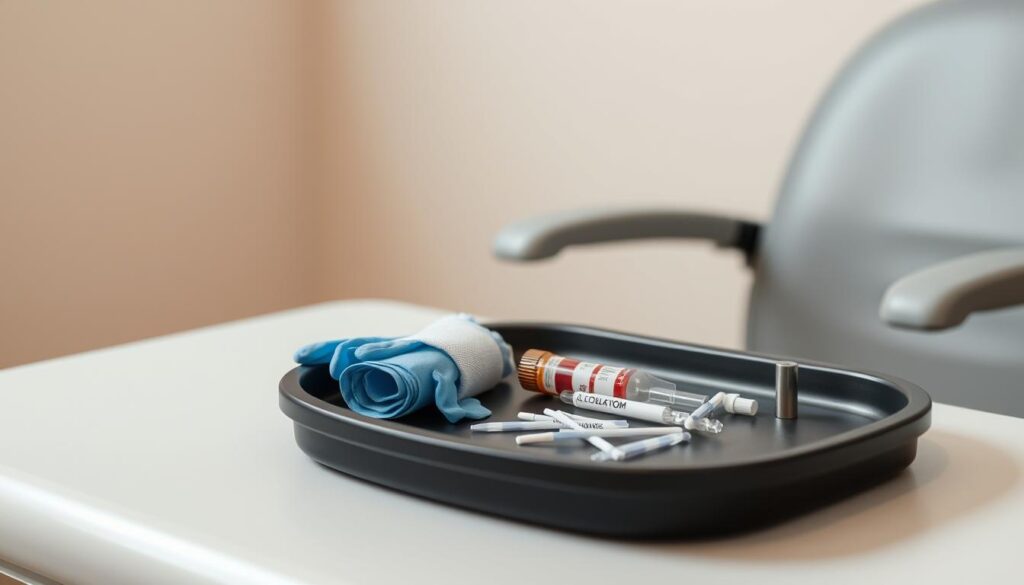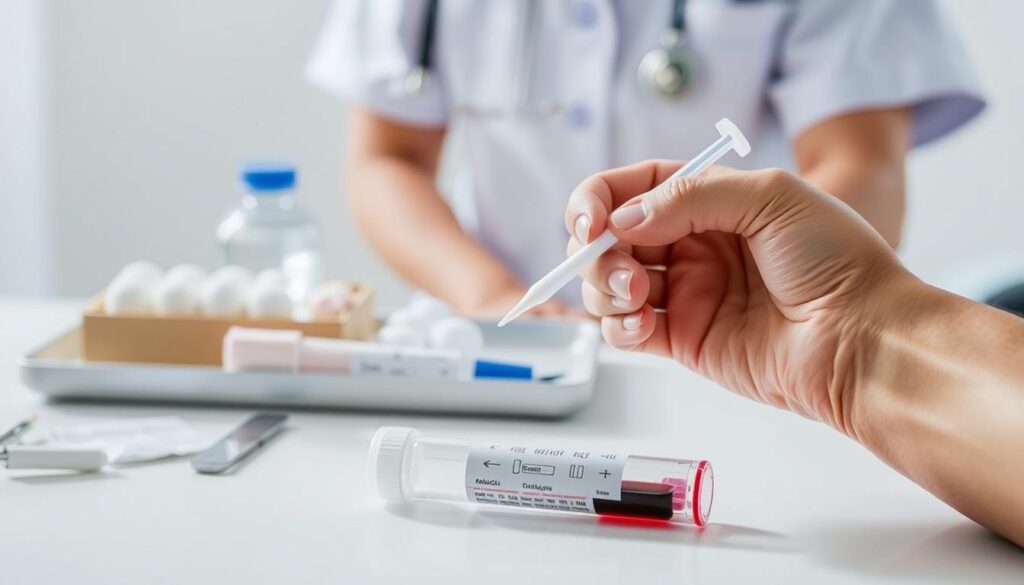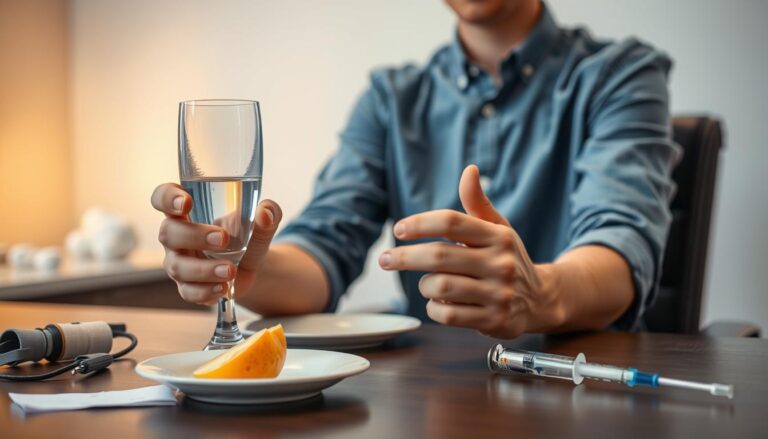How to Prepare Your Environment for a Safe Home Slot
Have you ever felt that familiar knot in your stomach before a lab visit? Blood tests shape critical health decisions, yet clinic environments can feel impersonal and rushed. Now imagine this: skilled professionals bringing this vital service to your living room, where comfort meets clinical precision.
In India’s bustling cities and remote villages alike, healthcare is evolving. Nearly 70% of diagnostic decisions rely on blood analysis, according to Dr. Colton Redding of Banner Health. But what if the clinic came to you? Home-based blood collection isn’t just convenient—it’s revolutionizing how we approach preventive care.
Creating the right space matters more than you might think. A well-organized area ensures accurate results while protecting both patients and technicians. From minimizing distractions to controlling room temperature, every detail contributes to a seamless process.
We’ll guide you through transforming any corner into a safe zone for blood draws. You’ll discover how simple adjustments reduce infection risks and enhance comfort. Let’s build a foundation for healthcare that works around your life, not the other way around.
Understanding the Importance of Home Phlebotomy in India
Blood tests form the cornerstone of modern healthcare, acting as silent storytellers of our inner well-being. In India’s fast-paced lifestyle, these diagnostics bridge urban and rural communities through mobile services.
Why Blood Tests Are Critical for Our Health
Our circulatory system carries vital clues about organ performance and hidden health risks. Routine blood analysis helps doctors:
- Detect diabetes markers before symptoms appear
- Monitor cholesterol levels affecting heart health
- Identify nutritional deficiencies common in Indian diets
Over 34% of urban Indians show abnormal thyroid levels, as per Apollo Hospitals’ 2023 report. Early detection through testing prevents complications.
An Overview of the Phlebotomy Process
Certified technicians follow strict protocols during home visits:
- Verify patient identity using government-approved IDs
- Select appropriate collection tubes based on test requirements
- Maintain sample integrity through temperature-controlled transport
This precision ensures lab results match clinic standards, whether testing for malaria in Mumbai or anemia in Manipur.
Creating a Safe and Organized Environment at Home
Your living room could become a reliable diagnostic space with thoughtful preparation. Let’s explore how to create an area that meets medical standards while keeping your comfort intact.

Essential Supplies and Setup Tips
Start by gathering these items before the technician arrives:
- Alcohol swabs and hand sanitizer
- Disposable gloves and biohazard waste container
- Clean towels and portable table
Choose a well-lit corner with armrest support. Natural light helps technicians locate veins easily. Keep pathways clear for equipment movement.
Ensuring Hygiene and a Calm Atmosphere
Wipe surfaces with disinfectant 30 minutes before the blood draw. Maintain room temperature between 22-25°C to prevent sample clotting. Play soft instrumental music to ease nerves.
Offer drinking water unless fasting is required. Proper hydration improves vein visibility. Avoid strong odors or distractions like loud TVs during the procedure.
Preparing Home for Phlebotomy: Step-by-Step Process
Proper preparation begins 24 hours before your scheduled visit. Follow this timeline to ensure accurate results and smooth sample collection.
Nutrition and Hydration Guidelines
Most tests require 8-12 hours without food. Confirm fasting requirements with your doctor. Drink 2-3 glasses of water 2 hours before your appointment – this plumps veins for easier access.
Avoid caffeine and alcohol 24 hours prior. These can alter cholesterol and blood sugar readings. Get 7 hours of sleep to stabilize hormone levels.
Creating the Ideal Workspace
Choose an armless chair near natural light. Clear a 3-foot area around the seating space. Keep your ID, doctor’s prescription, and insurance cards within reach.
| Time Before Appointment | Action Items | Important Notes |
|---|---|---|
| 24 Hours | Confirm fasting needs | Some tests allow black coffee |
| 12 Hours | Stop eating if fasting required | Continue drinking water |
| 2 Hours | Final hydration push | Wear loose sleeves |
| 30 Minutes | Set up verification documents | Aadhaar card accepted |
Phlebotomists need 5 minutes to verify documents before starting. Keep children and pets in another room during the procedure for safety.
Practical Tips to Enhance Your Blood Draw Experience
Quality blood collection relies on more than just technical skill. Simple adjustments to your routine and environment can transform this medical procedure into a smooth, stress-free interaction. Let’s explore how to collaborate effectively with healthcare teams for optimal results.

Expert Advice from Health Professionals and Phlebotomists
Dr. Colton Redding emphasizes hydration as the golden rule. “Drink 2-3 glasses of water 2 hours before your appointment,” he advises. This plumps veins while maintaining blood consistency. Avoid caffeine – it constricts blood vessels and alters some test readings.
Seasoned phlebotomists recommend loose, short-sleeved clothing for easy arm access. Cotton works best – synthetic fabrics can trap heat and make veins retreat. Position yourself in a stable chair with arm support, keeping both feet flat on the floor.
Coordinate medication schedules with your doctor beforehand. Most prescriptions should continue unless specified. Schedule afternoon slots if possible – morning rush hours often delay technicians managing multiple fasting patients.
Keep these items ready when the technician arrives:
- Government ID and doctor’s prescription
- List of current medications
- Warm compress (if you have difficult veins)
Clear communication helps technicians work efficiently. Mention any history of fainting or needle anxiety upfront. Most professionals carry cold packs and elevation pillows to address these concerns promptly.
Health and Safety Considerations for a Secure Home Blood Draw
Did you know 30% of adults experience needle anxiety during blood tests? We’ll help you navigate this safely through proven techniques and clear aftercare guidelines.
Calming Techniques for Needle-Related Stress
Try these science-backed methods during your appointment:
- 4-7-8 breathing: Inhale for 4 seconds, hold for 7, exhale for 8
- Progressive muscle relaxation starting from toes
- Guided meditation apps like CureFit or Headspace
Inform your phlebotomist about any discomfort immediately. They carry cold packs and numbing sprays for sensitive patients.
Essential Aftercare Practices
Follow these steps post-blood draw:
- Keep the bandage dry for 2 hours
- Apply gentle pressure if slight bleeding occurs
- Monitor for unusual warmth or redness
| Normal Reactions | Warning Signs | Action Required |
|---|---|---|
| Small bruise (2-3 cm) | Swelling beyond 5 cm | Contact doctor |
| Mild tenderness | Persistent bleeding | Apply firm pressure |
| Brief dizziness | Fever/chills | Visit emergency care |
Most patients resume activities within an hour. Avoid heavy lifting for 24 hours to prevent vein irritation.
Conclusion
Reliable blood tests start with the right environment, even outside clinical labs. By maintaining proper hygiene and following pre-test guidelines like fasting, patients ensure accurate results mirroring hospital standards. Simple steps—hydration, document organization, and clear communication—create smooth experiences for both individuals and technicians.
Collaboration with certified professionals guarantees safety protocols match lab-quality care. These practices not only streamline the process but also empower better health management through precise diagnostics. Proper blood collection techniques prevent errors, keeping your insights trustworthy.
Remember, your active participation transforms any space into an effective testing zone. When patients and providers work together, we bridge convenience with medical excellence—one successful draw at a time.







